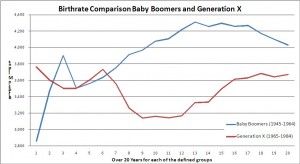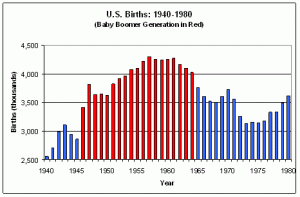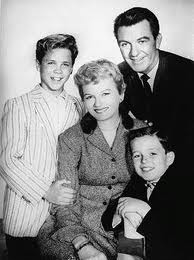Your ExitMap Blog gathers contributions from top exit planning professionals across the country that are indexed into four categories. They include select strategies for planning your exit, ideas for building your company’s value, transfer options you can choose from, or preparing to enjoy your post-exit lifestyle. This page shows the most recent posts from Your ExitMap Blog. If you are seeking a qualified exit planning professional, you can view a map of specialists here.
All articles are copyrighted by the authors, and reprinted here with permission. Each author’s contact information is available via a link at the end of the article.
Most Recent Your ExitMap Blog Articles
Most Recent Blog Articles
Beating the Boomer Bust We’ve looked at the coming generation of business buyers, and many things about that picture aren’t pretty. When I present to business owners about the Boomer Bust, this is around the time that someone in the audience says “So, are we just screwed?” No. There are things you can do to make your business more transferable, and more appealing to those buyers who will be looking for an opportunity. First, remember that my generalizations about a generation are just that. Both words derive from the Latin root genus, which meant both “birth” and “type.” A historical comment: it’s interesting that one word meant both things, because it was ... Read more We’ve looked at the coming generation of business buyers, and many things about that picture aren’t pretty. When I present to business owners about the Boomer Bust, this is around the time that someone in the audience says “So, are we just screwed?” No. There are things you can do to make your business more transferable, and more appealing to those buyers who will be looking for an opportunity. First, remember that my generalizations about a generation are just that. Both words derive from the Latin root genus, which meant both “birth” and “type.” A historical comment: it’s interesting that one word meant both things, because it was ... Read more The Gen X Business Buyer Generation X’ers aren’t mini-Boomers. Raised in a rapidly growing economy by parents that approached child rearing as a competitive activity, they saw more, did more, and were given more than their parents could have dreamed of. I took my first commercial airline ride when I was 25 years old (and before my mother’s first flight). My two sons had each boarded planes over 50 times before they were in high school. I was not an athlete, and have no hardware to display testifying to any athletic prowess. My youngest son made varsity in one sport, for one year. Yet he has a bookcase full of ... Read more Generation X’ers aren’t mini-Boomers. Raised in a rapidly growing economy by parents that approached child rearing as a competitive activity, they saw more, did more, and were given more than their parents could have dreamed of. I took my first commercial airline ride when I was 25 years old (and before my mother’s first flight). My two sons had each boarded planes over 50 times before they were in high school. I was not an athlete, and have no hardware to display testifying to any athletic prowess. My youngest son made varsity in one sport, for one year. Yet he has a bookcase full of ... Read more The X Factor There are two sides to every business transaction, a buyer and a seller. For most of the last 50 years in America, the Baby Boomers have been the biggest buyers in history. They bought homes and cars to spur the economy after World War II. They bought franchises to provide services for each other as busy parents. They bought SUVs and McMansions when they became the affluent middle-aged. Squeezed out of a corporate America that didn’t have room for them, and couldn’t offer the clear path to success they had been raised to expect, the Boomers formed new businesses in numbers unmatched before or since. In 1975, ... Read more There are two sides to every business transaction, a buyer and a seller. For most of the last 50 years in America, the Baby Boomers have been the biggest buyers in history. They bought homes and cars to spur the economy after World War II. They bought franchises to provide services for each other as busy parents. They bought SUVs and McMansions when they became the affluent middle-aged. Squeezed out of a corporate America that didn’t have room for them, and couldn’t offer the clear path to success they had been raised to expect, the Boomers formed new businesses in numbers unmatched before or since. In 1975, ... Read more Outsourcing America The Baby Boomers created seismic shifts in American culture and economics throughout their lives. Their mere numbers caused much of the shift, but their competitiveness and commonality enhanced the impact at every stage of their lives. In the mid 1960’s, as we’ve seen, the Boomers delayed having children. Unlike every previous generation, they chose to work longer and accumulate, or at least spend more, wealth. The “trough” of birthrates was lowest between about 1968 and 1978. By the early 1980’s, the Boomers began their delayed child-bearing in earnest. As the parents of Generation X, the Boomers didn’t suddenly abandon their defining characteristics. They became competitive parents. Parenting ... Read more The Baby Boomers created seismic shifts in American culture and economics throughout their lives. Their mere numbers caused much of the shift, but their competitiveness and commonality enhanced the impact at every stage of their lives. In the mid 1960’s, as we’ve seen, the Boomers delayed having children. Unlike every previous generation, they chose to work longer and accumulate, or at least spend more, wealth. The “trough” of birthrates was lowest between about 1968 and 1978. By the early 1980’s, the Boomers began their delayed child-bearing in earnest. As the parents of Generation X, the Boomers didn’t suddenly abandon their defining characteristics. They became competitive parents. Parenting ... Read more Work-Life Balance The term “Work-Life Balance” is widely cited as first occurring in the United State in 1986 in a research paper. I can’t identify the specific source of this much-referred usage, but it is telling that it would pop up when the last Baby Boomers had just turned 21. They were all in the labor pool, and their competitiveness (see The Brass Ring) was rapidly becoming the norm in the workplace. In the period beginning in 1912, the Federal Government began passing legislation to limit the number of hours that could be demanded of a worker. With the passage of the Fair Labor Standards Act of 1938, the concept ... Read more The term “Work-Life Balance” is widely cited as first occurring in the United State in 1986 in a research paper. I can’t identify the specific source of this much-referred usage, but it is telling that it would pop up when the last Baby Boomers had just turned 21. They were all in the labor pool, and their competitiveness (see The Brass Ring) was rapidly becoming the norm in the workplace. In the period beginning in 1912, the Federal Government began passing legislation to limit the number of hours that could be demanded of a worker. With the passage of the Fair Labor Standards Act of 1938, the concept ... Read more The Brass Ring A long, long time ago (I’ve actually ridden only one such in my lifetime) Carousels had a spring-loaded sleeve of brass rings protruding near the innermost (and least popular) track of horses. A bigger kid could lean out and yank a ring from the sleeve with considerable effort, and be rewarded with a free ride. Today, of course, we can’t even read the description of such an ill-conceived device without cringing at the thoughts of fallen children, their bodies horrifically mangled in the giant gears of the turntable, and the litigation and public outrage that would follow. Times change. “Reaching for the brass ring” has become a ... Read more A long, long time ago (I’ve actually ridden only one such in my lifetime) Carousels had a spring-loaded sleeve of brass rings protruding near the innermost (and least popular) track of horses. A bigger kid could lean out and yank a ring from the sleeve with considerable effort, and be rewarded with a free ride. Today, of course, we can’t even read the description of such an ill-conceived device without cringing at the thoughts of fallen children, their bodies horrifically mangled in the giant gears of the turntable, and the litigation and public outrage that would follow. Times change. “Reaching for the brass ring” has become a ... Read more The Pig in the Python The title of this section refers to a well-known biological phenomenon. The python family of snakes have hinged jaws that allow them to swallow animals much larger than their heads. These animals are gradually consumed as they pass through the snake’s digestive system. If the prey is very large, you can plainly see the shape of the animal as it moves through the snake. It is just as easy to identify the progress of the Baby Boom generation through the American population. Whatever stage of life the Boomers were experiencing, the country was experiencing. And we all experienced it together. (see my timeline at The ... Read more The title of this section refers to a well-known biological phenomenon. The python family of snakes have hinged jaws that allow them to swallow animals much larger than their heads. These animals are gradually consumed as they pass through the snake’s digestive system. If the prey is very large, you can plainly see the shape of the animal as it moves through the snake. It is just as easy to identify the progress of the Baby Boom generation through the American population. Whatever stage of life the Boomers were experiencing, the country was experiencing. And we all experienced it together. (see my timeline at The ... Read more The Approaching Tidal Wave A year ago this month, I began speaking to business owner groups about “Beating the Boomer Bust.” Since then I’ve delivered the presentation over 20 times, both locally and to national groups, and the requests for it are increasing. It’s the product of a year of research, and of fifteen years helping business owners prepare to leave their companies. I’m convinced, actually I am certain, that small business owners in America are ignoring a tidal wave of change that, just like a real tidal wave, will leave a few small businesses untouched while wiping many others from the face of the planet. Am I being dramatic? Absolutely. Am ... Read more A year ago this month, I began speaking to business owner groups about “Beating the Boomer Bust.” Since then I’ve delivered the presentation over 20 times, both locally and to national groups, and the requests for it are increasing. It’s the product of a year of research, and of fifteen years helping business owners prepare to leave their companies. I’m convinced, actually I am certain, that small business owners in America are ignoring a tidal wave of change that, just like a real tidal wave, will leave a few small businesses untouched while wiping many others from the face of the planet. Am I being dramatic? Absolutely. Am ... Read more Hunting vs. Farming At the family gathering, you are being introduced to a distant cousin you haven’t seen since childhood. The introduction usually includes your status as a business owner. “Do you remember little Cousin Bobby? He owns his own company now.” Or you hear it as you pass a conversation; “There goes Rebecca. You know, she has her own business.” You know what they are thinking. It may be the somewhat awed tone of being in the presence of success, or a “Who would believe it?” skepticism. When you are a business owner among non-owners, the undercurrent of envy and admiration comes from certain commonly held beliefs ... Read more At the family gathering, you are being introduced to a distant cousin you haven’t seen since childhood. The introduction usually includes your status as a business owner. “Do you remember little Cousin Bobby? He owns his own company now.” Or you hear it as you pass a conversation; “There goes Rebecca. You know, she has her own business.” You know what they are thinking. It may be the somewhat awed tone of being in the presence of success, or a “Who would believe it?” skepticism. When you are a business owner among non-owners, the undercurrent of envy and admiration comes from certain commonly held beliefs ... Read more The (pen)Ultimate Hire Every sane business owner will acknowledge that there is a point at which his or her own skills are no longer sufficient to grow the business beyond its current level. The revenue point where that happens differs by industry, but it frequently begins at around 20 employees. At that point, an owner becomes swamped by the conflicting needs of managing the existing operation, and having enough time to perform the tasks that made the business grow in the first place. The owner realizes that further growth requires the addition of a key employee; one who can assume some of the owner’s duties so that he or she can focus on ... Read more Every sane business owner will acknowledge that there is a point at which his or her own skills are no longer sufficient to grow the business beyond its current level. The revenue point where that happens differs by industry, but it frequently begins at around 20 employees. At that point, an owner becomes swamped by the conflicting needs of managing the existing operation, and having enough time to perform the tasks that made the business grow in the first place. The owner realizes that further growth requires the addition of a key employee; one who can assume some of the owner’s duties so that he or she can focus on ... Read more |
|
Keystone Content: Are you just beginning your exit planning journey? Here are two short articles from Your ExitMap Blog to help get you started. 3 Inarguable Reasons How prepared are you to Take a FREE 15-minute FIND A QUALIFIED EXIT PLANNER |




